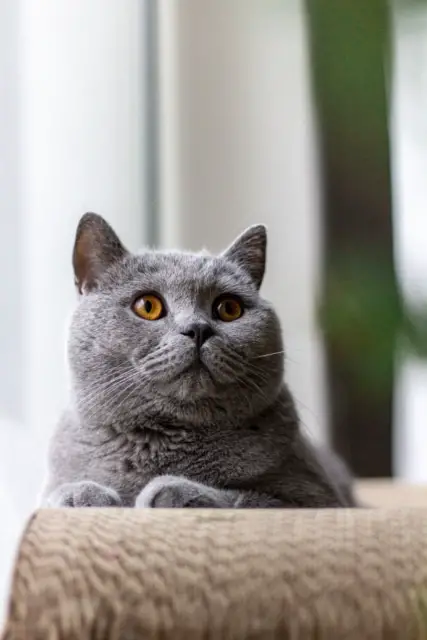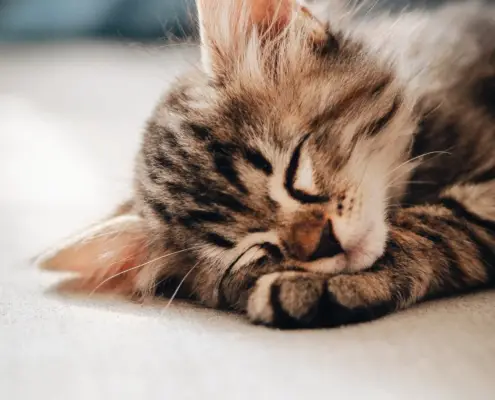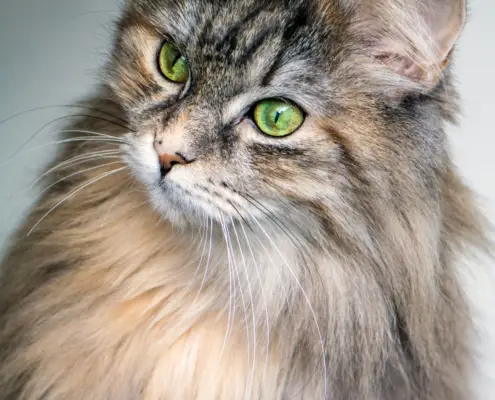Breed Name
British Shorthair
Alternate Names
Highlander, Highland Straight, Britannica, British Blue

The British Shorthair cat breed is known for its majestic appearance and unique traits that set it apart from other feline companions. With its round face, dense coat, and sturdy build, the British Shorthair exudes an air of regality and sophistication. In this comprehensive guide, we will delve into the history, physical characteristics, personality, and care requirements of the British Shorthair, shedding light on why it is a popular choice among cat enthusiasts.
History and Origin of the British Shorthair
The British Shorthair has a rich history that can be traced back to ancient times. Its ancestors were believed to have been brought to Britain by the Romans, who used them to control the rodent population on their ships. Over the centuries, the breed evolved naturally, adapting to the harsh British climate and developing its distinct features. It wasn’t until the late 19th century that the breed was recognized and selectively bred for its desirable traits, leading to the establishment of the British Shorthair as we know it today.
Physical Characteristics and Unique Traits of the British Shorthair
The British Shorthair is known for its robust physique and dense, plush coat. Its round head, full cheeks, and large, round eyes give it an adorable and expressive appearance. The breed comes in various colors and patterns, including the iconic “British Blue” with its striking silver-blue coat. Another distinguishing feature of the British Shorthair is its stocky build, with a broad chest and short, strong legs. These unique traits contribute to the breed’s overall charm and appeal.
Personality and Temperament of the British Shorthair
Despite its royal appearance, the British Shorthair has a gentle and easygoing personality. They are known for their calm and reserved nature, making them an excellent choice for families and individuals seeking a low-maintenance pet. British Shorthairs are independent yet sociable cats that enjoy the company of their human companions. They are not overly demanding and are content to spend their days lounging around the house, although they do appreciate interactive playtime and toys to keep them mentally stimulated.
Grooming and Care Tips for the British Shorthair
The British Shorthair’s dense coat requires regular grooming to keep it in optimal condition. Brushing their fur once or twice a week helps to remove loose hair and prevent matting. Additionally, their nails should be trimmed regularly, and their ears checked for any signs of infection. Dental hygiene is also important, and regular brushing of their teeth is recommended. British Shorthairs are generally healthy cats, but it is essential to schedule regular veterinary check-ups to ensure their overall well-being.
Health Concerns and Common Medical Issues in British Shorthairs
While the British Shorthair is generally a healthy breed, there are a few health concerns that potential owners should be aware of. Hypertrophic cardiomyopathy, a heart condition, can occasionally occur in British Shorthairs. Regular heart screenings by a veterinarian are recommended to detect any early signs of this condition. Additionally, obesity can be a concern, so a balanced diet and regular exercise are crucial to maintaining their weight. Regular vaccinations and preventative measures against fleas and ticks are also essential to their overall health and well-being.
Feeding and Nutrition Guidelines for the British Shorthair
Proper nutrition is vital for the overall health and longevity of the British Shorthair. A high-quality cat food that meets their specific nutritional needs should be provided. Due to their stocky build, British Shorthairs have a tendency to gain weight, so portion control and a balanced diet are crucial. It is important to consult with a veterinarian to determine the appropriate feeding regimen and to monitor their weight to prevent obesity-related health issues.
Training and Socialization for British Shorthair Cats
British Shorthairs are intelligent cats that can be trained with patience and positive reinforcement. They respond well to clicker training and can learn tricks and commands. However, it is important to remember that they have an independent streak, so training sessions should be kept short and engaging. Socialization is also crucial, especially during their early development stages. Introducing them to various people, animals, and environments helps them become well-adjusted and sociable companions.
Finding a British Shorthair Cat Breeder and Adoption Options
If you are considering adding a British Shorthair to your family, it is important to find a reputable breeder or consider adoption options. Reputable breeders will prioritize the health and well-being of their cats and provide proper documentation and certifications. Adoption from a rescue or shelter is another option, giving you the opportunity to provide a loving home to a cat in need. Research and visit multiple breeders or shelters to ensure that you find the right match for you and your lifestyle.
Why the British Shorthair is a Great Choice for a Pet
In conclusion, the British Shorthair cat breed offers a combination of unique physical traits and a charming personality that makes it a great choice for a pet. Their regal appearance, calm temperament, and low-maintenance care requirements make them an ideal companion for families, individuals, and even those living in apartments. Whether you are looking for a lap cat or a feline friend to share your home with, the British Shorthair is sure to captivate your heart and bring joy to your life.
Discover the beauty and grace of the British Shorthair cat breed today and experience the unparalleled companionship they have to offer. Find a reputable breeder or adoption agency near you and embark on a journey of love and friendship with these majestic cats.
If you enjoyed my article, I would appreciate you sharing it with your network.

Sima Ndlebe
Sima writes for CatBuzz. He is interested in Cats, Health and Fitness, and Entrepreneurship.
Published: 10 October 2023



